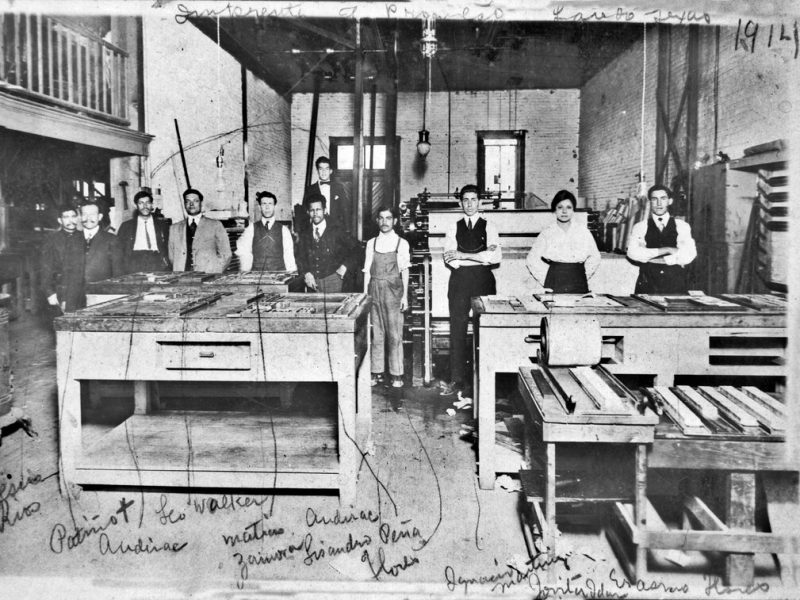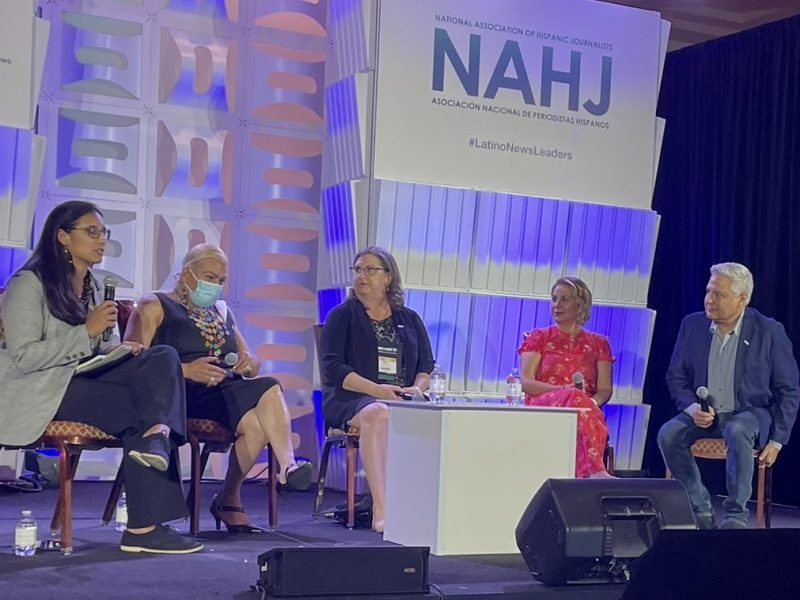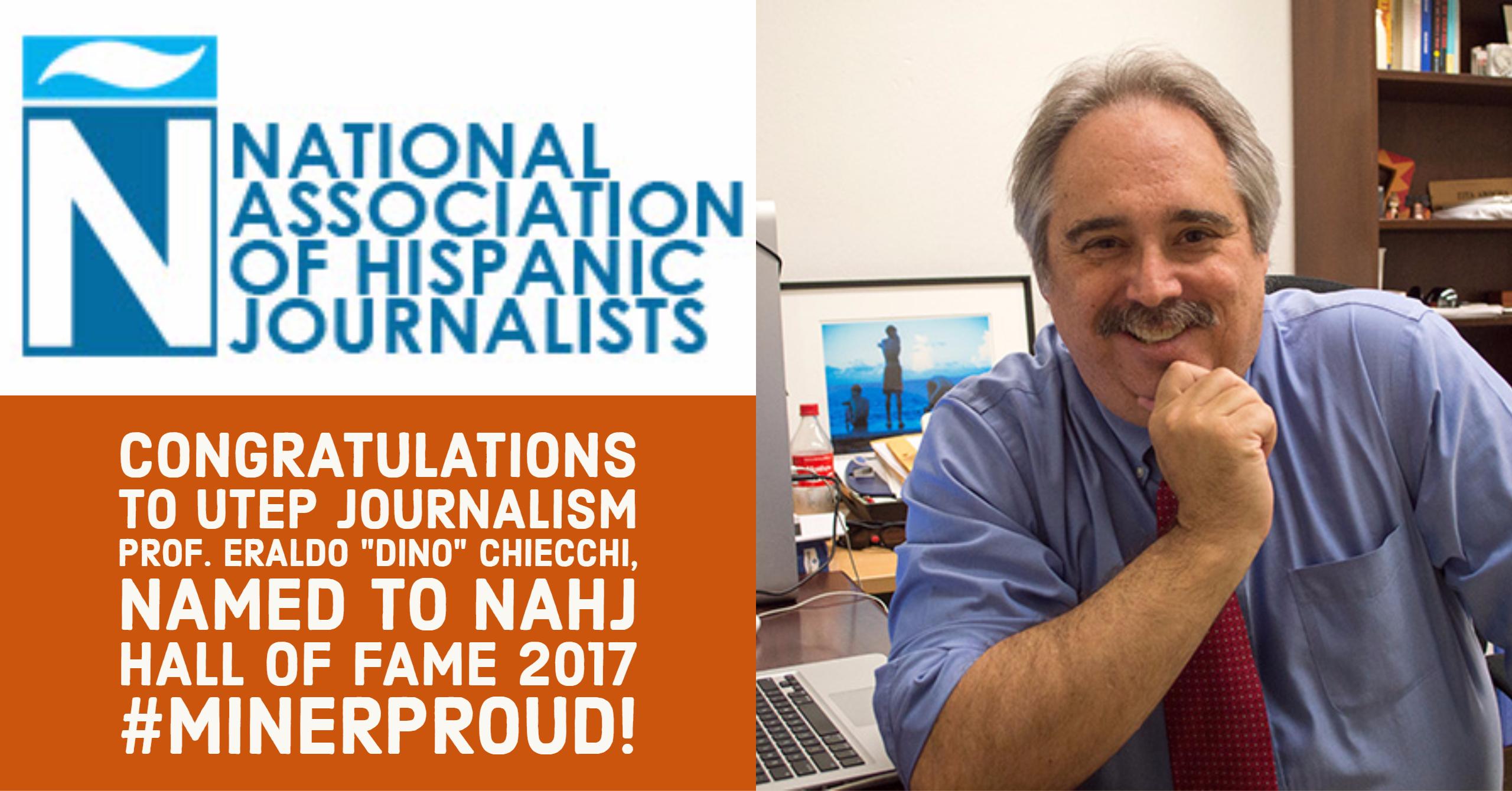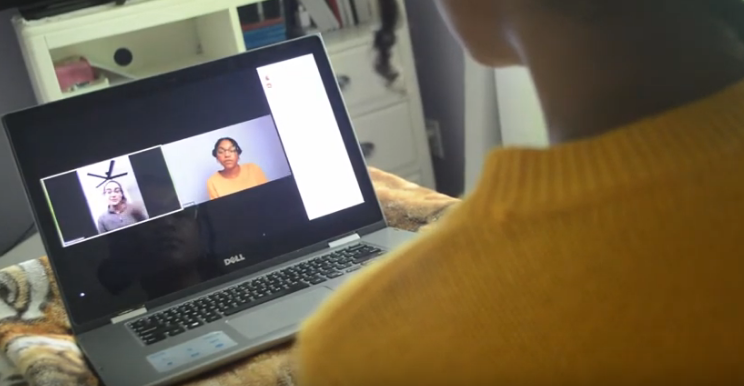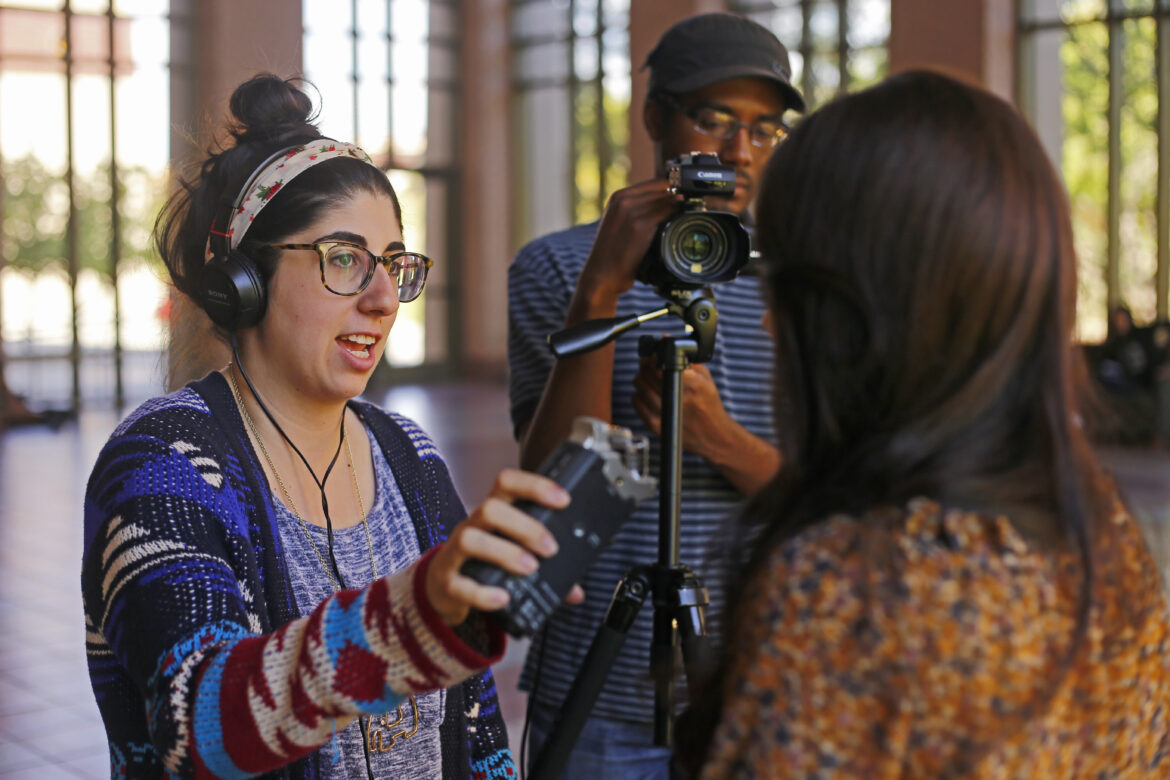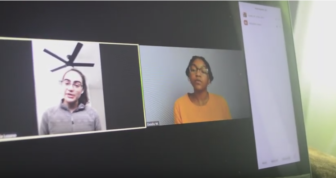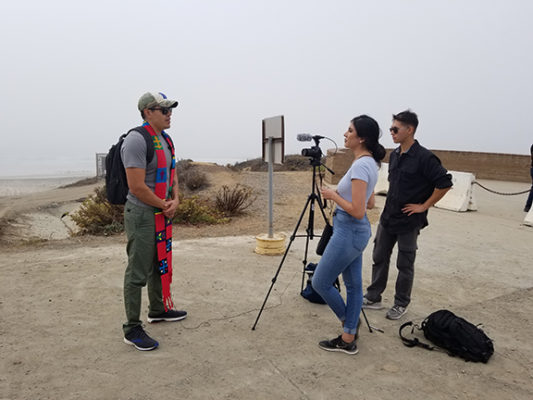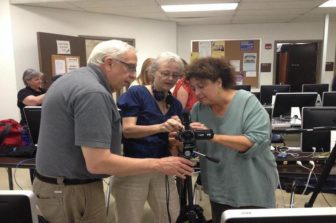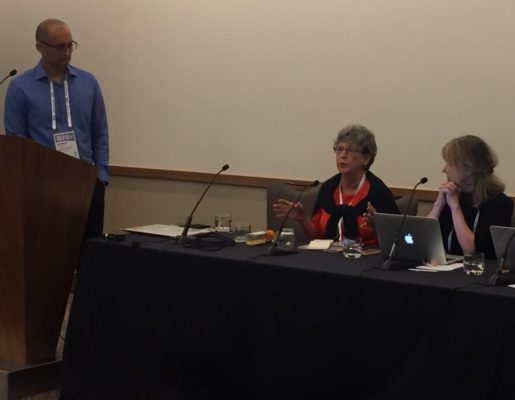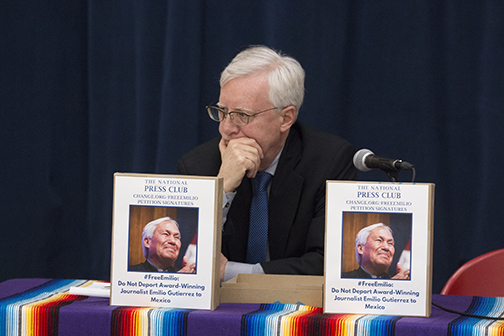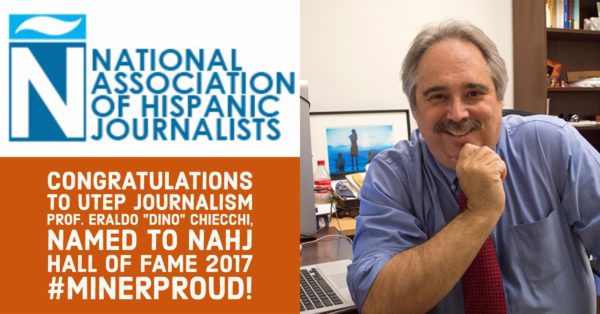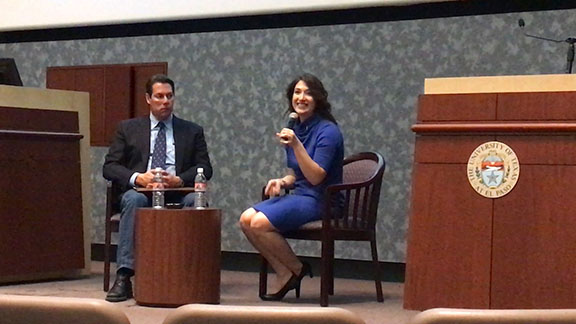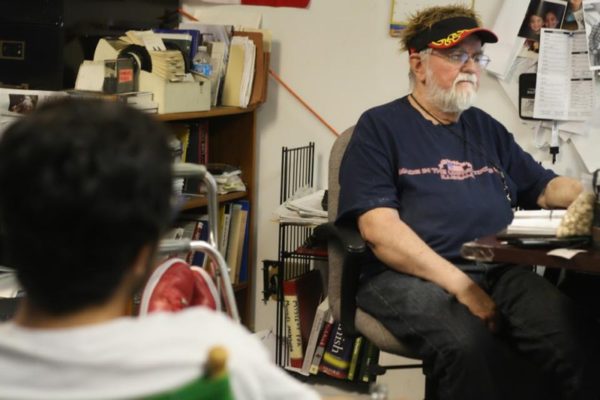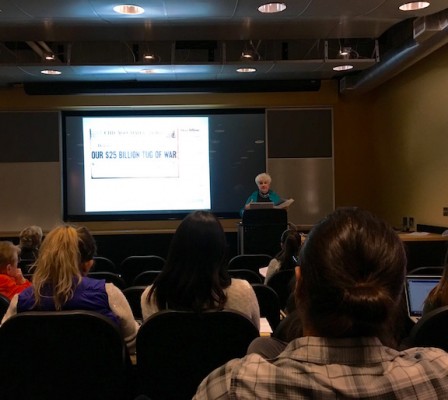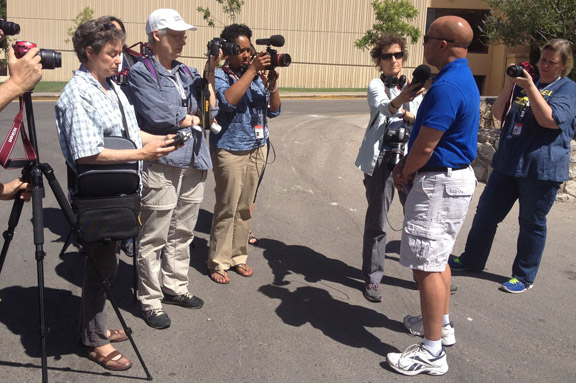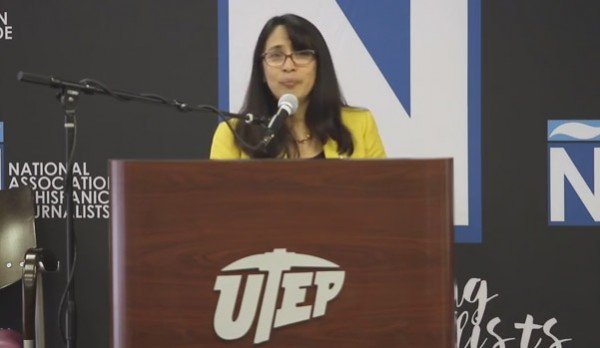WASHINGTON – The U.S. Mint began circulating a quarter honoring Texas Mexican-American journalist Jovita Idár, on Aug. 14. It is the fourth coin in the 2023 American Women Quarters Program on August 14th. Jovita Idár, was a Mexican-American journalist, activist, teacher, and suffragist. She made it her mission to pursue civil rights for Mexican Americans and believed education was the foundation for a better future.
Journalism internship endowment honors former UTEP student Annette Rainville
|
Editors note: This article was originally published on September 14, 2014 in the special Centennial Issue of The Prospector. Annette Rainville, who was a reporter and editor at The Prospector, graduated from UTEP with a bachelor’s degree in print media in spring 2004. During her long process of going to school and working to raise her twin boys, Anthony and Ryan, and daughter Audrey, Rainville was also fighting her initial battle with leukemia. She was in remission and went to work as an intern with the Scripps Howard News Bureau in Washington, D.C. in fall 2004. She worked alongside reporter Lisa Hoffman, who was the bureau’s main reporter on the war in Iraq.
Longtime KVIA-Channel 7 GM Kevin Lovell retiring; Brenda De Anda-Swann named successor
|
El Paso – KVIA-TV announced this week that Brenda De Anda-Swann will take the helm as general manager when longtime GM Kevin Lovell retires at the end of May.
Microsoft investing in local journalism for El Paso-Juarez community, UTEP students
|
The Microsoft local journalism project will include a grant to the El Paso Community Foundation to support nonprofit news organizations, including El Paso Matters, KTEP public radio, the University of Texas at El Paso multimedia journalism program and La Verdad.
Video: Why does it matter how pandemic data is controlled?
|
By Julia Lane, New York University
The Conversation Editor’s note: When the Trump administration ordered hospitals to report COVID-19 data to the Department of Health and Human Services rather than the Centers for Disease Control and Prevention as they had been doing, it provoked worries and criticism from public health experts. The White House said that the HHS system will provide more accurate data faster, but the switch did raise concerns that political considerations would influence what data is reported. Professor of public policy Julia Lane, who recently published the book “Democratizing Our Data: A Manifesto,” explains why public data is vital to public health and democracy in general. What was the main concern over the data? The whole point of having a career civil service running public data systems is that, because they can’t be fired, they have the integrity to produce the statistics the best way possible.
UTEP journalism student adapts to reporting from home
|
EL PASO – When health concerns over the coronavirus pandemic moved UT El Paso courses online in March, multimedia journalism major Exodis Ward wasn’t sure what to do for her next video story assignment. People were isolated at home. The city and school required social distancing protocols be followed. How could she cover a story without being in the same room as her sources? “It’s not very often that I draw a blank, so I pitched a very literal idea: How are reporters reporting from home?
Tribune en español, an alternative after Hoy’s shut down in Chicago
|
By Hallie Newnam, Special to Borderzine.com
CHICAGO – After 16 years, Hoy—the Spanish-language newspaper of the Tribune Publishing Company—has shut down. In mid-November, the Tribune announced that on Dec. 13, 2019 both Hoy’s print and online operations would end. However, the Tribune was reportedly “aggressively exploring other options” for its Hispanic audience. Many loyal followers of the publication were frustrated and confused about the newspaper’s abrupt end.
Adding ratings on source reliability helps limit spread of misinformation
|
By Antino Kim, Indiana University; Alan R. Dennis, Indiana University; Patricia L. Moravec, University of Texas at Austin, and Randall K. Minas, University of Hawaii
Online misinformation has significant real-life consequences, such as measles outbreaks and encouraging racist mass murderers. Online misinformation can have political consequences as well. The problem of disinformation and propaganda misleading social media users was serious in 2016, continued unabated in 2018 and is expected to be even more severe in the coming 2020 election cycle in the U.S.
Most people think they can detect deception efforts online, but in our recent research, fewer than 20% of participants were actually able to correctly identify intentionally misleading content. The rest did no better than they would have if they flipped a coin to decide what was real and what wasn’t.
Both psychological and neurological evidence shows that people are more likely to believe and pay attention to information that aligns with their political views – regardless of whether it’s true.
U.S.–Mexico border becomes multimedia journalism classroom for Cal State University students reporting from both sides
|
By Julio J. Bermejo
Dominic Torres wasn’t getting what he needed from the interview, and he knew it. Torres, a senior majoring in journalism at California State University, Fullerton, in Southern California, was on the outskirts of Tijuana, Baja California, in November at a residential shelter for child victims of sexual exploitation. He was there to interview “Lucy” (a pseudonym), a 21-year-old survivor of a childhood of abuse at the hands of her father. Her story was to be a central element of the multimedia news package on child sexual exploitation in the U.S.–Mexico border region Torres was assembling as part of his work in the university’s new course, “Specialized Reporting on Minorities of the Southern Border.”
See the stories: California State University Fullerton Reports From The Border
Yet, even though Lucy had agreed to the interview through the shelter director, who sat translating between her and Torres, who did not speak Spanish; even though the camera was trained only on her hands; and even with the promised use of the pseudonym and an offer to alter her voice in the footage, Lucy was reluctant to offer any details of her story. Torres slowly switched off the camera and hung his head in thought.
12 professors heading to U.S, Mexico border for Dow Jones News Fund Multimedia Training Academy 2019
|
Twelve journalism instructors from U.S. Hispanic Serving Institutions will travel to the U.S., Mexico border region to participate in the 10th annual Dow Jones News Fund Multimedia Training Academy May 31 – June 6 at the University of Texas in El Paso. Thanks to a grant provided by the Dow Jones News Fund, Borderzine organizes this annual training program geared to support multimedia journalism instructors who teach in institutions with a large minority population. Here is a list of the 12 instructors who were chosen and their institutions:
Nancy Garcia, West Texas A&M University
Jacqueline Fellows, University of North Texas
Ana Lourdes Cardenas, San Francisco State University
Stephanie Bluestein, California State University Northridge
Joel Harris, California State University San Bernadino
Farideh Dada, San Jose City College
Fredrick Batiste, Houston Community College System
Adam Schrag, Fresno Pacific University
Tara Cuslidge-Staiano, San Joaquin Delta College
Jenna Duncan, Glendale Community College
Walter Baranger, California State Fullerton
Steve Collins, University of Central Florida
The week-long multimedia-journalism academy has a proven track record of helping journalism educators acquire a new skills in digital storytelling that they can use to help prepare prepare the next generation of Latino college journalists for a competitive media market. “The trainers at the academy understand what educators need to learn about new and emerging technologies to better prepare their students for the fast-changing future” said Linda Shockley, Deputy Director of Dow Jones News Fund. “This quality of instruction at absolutely no cost to participants and their universities is priceless.”
The goal of this experience is to learn and practice news reporting using a variety of digital equipment, software programs and platforms. Participating instructors are expected to translate this learning into training for their students, making them more competitive in the media industry.
UTEP’s Borderzine wins prestigious national journalism grant for bi-national media project to tell real story of the borderlands
|
EL PASO – Borderzine – the University of Texas at El Paso’s award-winning web magazine – received a $35,000 grant from the Online News Association to fund a binational journalism multimedia project between the communities of El Paso and Ciudad Juarez. Students from UTEP, El Paso Community College and the Universidad Autónoma de Ciudad Juarez will work together on the project called “Engaging Community Across Borders Through Media.”
“It’s an ambitious project to engage border residents from the U.S. and Mexico sides to better relate to the rest of the world the reality of the border minus the usual stereotypes,” said Zita Arocha, professor of practice at UTEP and director of Borderzine. Local media from both sides of the border also will participate in the project with the goal of helping communities identify solutions to common binational issues such as immigration, transportation, environmental challenges, socio-economic development and health and medical needs, Arocha said. Key media partners include KTEP, El Diario de El Paso, El Paso Times, El Paso Inc., Ser Empresario, KVIA, Univision, Telemundo and KFOX. More than a dozen students from UTEP, EPCC and UACJ will work as a team to produce multilingual content about the borderlands – from podcasts to video stories to an e-book designed to dispel common myths about the region, Arocha said.
Borderzine among 150 newsrooms in national fundraising campaign supporting quality journalism
|
Washington, D.C. – The Borderzine Reporting Across Fronteras project at UT El Paso is among more than 150 nonprofit newsrooms across the country that will participate in this year’s NewsMatch, the largest grassroots fundraising campaign to support nonprofit news organizations. The national call-to-action will launch on Nov. 1, 2018. In 2017 NewsMatch helped to raise more than $4.8 million from individual donors and a coalition of private funders. This year the number of nonprofit news organizations participating has jumped by more than 40 percent.
Natassia Paloma feeling at home in return to El Paso to anchor KTSM newscast
|
After a broadening of horizons tour around Texas, the newest primetime anchor at NewsChannel 9 was ready to come home. Natassia Paloma, 30, is an El Paso native and a UTEP graduate who returned to her hometown to introduce her son Nathan to her biggest inspiration, her grandmother Palmira. “I definitely want him to be raised in the way I was raised. I was raised very humble and raised to be aware of people are going through,” Paloma said. “To really feel with your heart so I want my son to be raised in this culture and I want him to be bilingual and I want to raise him around the people in here.“
Palmira was instrumental in Paloma’s path to become a journalist.
El Paso news anchor Estela Casas shares her breast cancer battle
|
Estela Casas announced Sept. 14 she had just joined a group every woman dreads. The local celebrity and KVIA-TV news anchor has breast cancer, and announced it to her viewers to call attention to the disease. Casas has been part of El Paso’s viewership for 35 years and through her long career she has become a respected and admired personality, far more than a news anchor. This is not the first time that Casas has shared news about her medical experiences and procedures with the public.
National Press Club shocked to see acclaimed Mexican journalist who sought asylum from death threats facing deportation in Texas
|
EL PASO, Texas – While many people prepare to celebrate the holidays, Mexican journalist Emilio Gutierrez Soto remains in an immigration detention cell after seeking asylum because he fears he’d be killed if he returned to his native Mexico. Gutierrez Soto, honored for his courageous reporting by the Washington, D.C. –based National Press Club and the National Association of Hispanic Journalists, sits in a U.S. Citizenship and Immigraton Services (USGIS) cell in El Paso awaiting his fate. He was detained Dec. 7 when an immigration judge determined he would be deported. “I can’t explain with words how shocking it is to see someone who has been honored in Washington and then the next time we see him he is in prison clothes,” said William McCarren, executive director of the National Press Club, a non-profit organization that represents more than 3,100 journalists worldwide.
Latino journalists, please tell us how its going for you at work
|
The world of journalism is changing – morphing into something not anticipated just a few short years ago.
With those changes, the workplace has evolved into something entirely different from what we used to know and opportunities for advancement also might have changed.
So, how’s it going? Have the changes been good to you, your career? Are you better off now than you were before the digital revolution? Are you still getting the job satisfaction and opportunities you received prior to the industry’s evolution to a more digital platform?
We’d like to know – anonymously, of course. We are polling members of the National Association of Hispanic Journalists and other Latino journalists to find out.
Two researchers at the University of Texas at El Paso, professors Maria de los Angeles Flores and Zita Arocha, are conducting a survey among Latino journalists to determine how the changes have affected opportunities and job satisfaction.
Researchers will continue to collect data through the end of December and the results of the survey will be presented at the NAHJ 2018 conference in Miami.
“It is essential to identify the obstacles that Latino journalists face daily to generate dialog within their respective organizations on effective approaches to better train, retain and promote journalists of color,” Flores said.
The results will be forward to media leaders and media organizations after they are presented in Miami.
The survey will improve the organization’s ability to “comprehend, assess and map the frontier of the industry for journalists at any level in their career,” said NAHJ President Brandon Benavides.
2nd UTEP journalism professor named to NAHJ Hall of Fame
|
UTEP associate professor of practice and the incoming executive editor of Borderzine, Eraldo “Dino” Chiecchi, has been named to the National Association of Hispanic Journalists Hall of Fame for 2017. Chiecchi is one of five of the nation’s top journalists, academics and documentarians who will be inducted into the NAHJ Hall of Fame during the group’s annual convention in September in Anaheim, California. Zita Arocha, Borderzine’s founder and an associate professor of practice in journalism at UTEP, was inducted into the NAHJ Hall of Fame in 2016. NAHJ’s class of 2017 includes Chiecchi, current multimedia professor at University of Texas at El Paso; trailblazer of diversity Federico Subervi, Ph.D.; journalist and documentary producer Andrés Cediel; NBC Bay Area reporter Jodi Hernandez and Pulitzer Prize winner Nancy Rivera Brooks. The gala honoring these individuals will be Saturday, September 9, 2017 at the House of Blues Anaheim during the Excellence in Journalism Conference.
Area media leaders share insight for students interested in journalism
|
Local area media editors and producers advised students during a job-seeking seminar to take opportunities and get their foot in the door even if the ideal job isn’t available yet in today’s changing media environment. “Take anything. Take it, get yourself in that newsroom,” said Wendy White Polk, managing editor at El Paso Inc.
She stressed that getting the proverbial foot in the door is important even if it’s not the position student journalists are seeking. “That’s how you can then learn the operation, you can get to know the people, you can make suggestions for story ideas, you can volunteer to write something, you can bring some knowledge for your community or your neighborhood or your high school or whatever group you belong to, to help broaden the story. Make yourself indispensable, but get paid,” Polk said.
Creator of Facebook Live addresses antisemitism and ‘fake news’ at UTEP event
|
The University of Texas at El Paso hosted media innovator and former Facebook executive Randi Zuckerberg Feb. 21 at the Undergraduate Learning Center who spoke to an intimate crowd about her Jewish background and the proliferation of “fake news” during and after President Donald Trump’s successful campaign for president. During her talk to a crowd of over 100 people, she discussed a variety of topics such as the roles and responsibilities of media in people’s daily lives. She also discussed the rise of “fake” news and how we now live in a world where media’s focus has become getting the news out “faster, quicker, better and then check it later.” Zuckerberg is a graduate of Harvard University and a 2011 Emmy nominee, who has become an important figure in the world of media, having created the Facebook Live streaming video service and launching Zuckerberg Media, whose mission is to inspire tech-savvy entrepreneurial girls and women by creating content.
The Hispanic Link archives project: Four decades of Latino political and news history worth preserving online for the future
|
Before alternative news media outlets like the Huffington Post provided an outlet for communities to tell their stories to a national audience, Hispanic Link News Service acted on behalf of the Latinos nationwide by covering political news through a Latino lens. Started in February 1980 in the basement of a Washington, DC apartment building by veteran journalist and editor Charlie Ericksen, the Link provided over 30 years more than 5,500 columns and broke the national op/ed-page barrier of nationally syndicated newspapers. While Ericksen edited and mentored dozens of talented young Latino journalists in his downstairs newsroom, his wife, companion and Link cofounder, Sebastiana, provided emotional and physical sustenance to scores of “Linkies,” until her unexpected death several years ago. Until it stopped publishing in 2015 when Ericksen, in his 80’s, retired and moved to Southern California to be close to his children, the scrappy sometimes irreverent but always fact-filled and insightful newsletter often took to task the politically well-connected and powerful, including mainstream news media leaders, for ignoring this growing group’s issues, interests and contributions. Now his sons, Carlos and Hector Ericksen-Mendoza, are intent on preserving and making available online all of the Link’s work, including columns, newsletters, taped interviews and photographs.
El Paso Times’ 1st woman president in 135-year history ready for the digital age
|
Lilia Castillo Jones is driven, has quickly forged relationships with members of the community and, after many years of media industry experience, is taking the helm as the first woman president of the El Paso Times in its 135-year history. Jones began her appointment at the Times in September and quickly began making her mark. “Lilia has a strong commitment to the important role the media plays for the community,” said Robert Moore, editor of the El Paso Times. “She is passionate about generating the revenue we need to do the important journalism for El Paso and the New Mexico communities we serve, she also has a wonderful sense of humor.”
In addition to being president of the El Paso Times, Castillo Jones oversees the seven partner newspapers based in New Mexico and their web sites, including the Las Cruces Sun-News and others.She is responsible for the revenue and digital growth of the organization’s advertising and circulation products. Castillo Jones said the El Paso Times is committed to providing strong digital and newspaper marketing solutions for business owners.
Environmental justice for poor and minority communities featured at National Communication Association convention
|
PHILADELPHIA — Environmental justice in poor and minority communities, such as the U.S.-Mexico Border region and the city of Philadelphia, took center stage at sessions during the 2016 annual convention of The National Communication Association (NCA) early November. Kathleen de Onis, a doctoral student at Indiana University, said she was motivated to organize the environmental sessions at NCA, because, “it is really important for us to have an engaged community where members can bring in their experience and their knowledge to share their struggles and their successes.” Students from several universities, including speech and multimedia journalism majors from the University of Texas El Paso, provided presentations at the Building Bridges/Construyendo Puentes sessions on how some underrepresented communities face a variety of environmental justice challenges, from air contamination to soil toxicity and damage from floods. In addition to the UTEP undergraduate students, several doctoral students from the The University of Colorado at Boulder (UCB) and Indiana University (IU) also participated.
The students shared the stage with local environmental experts from Philadelphia.
Borderzine director Zita Arocha inducted into NAHJ Hall of Fame
|
By Rene Delgadillo, UTEP Prospector
UTEP Associate Professor of Practice Zita Arocha was inducted to the NAHJ 2016 Hall of Fame on Friday, Aug. 5, for her journalism career and for serving Hispanic and Latino students. “I think it is a huge honor for UTEP because it really focuses attention on what we’ve done there over the last 14 years, and by that I’m talking about the whole team in our department,” Arocha said. “I feel really blessed and privileged to have had the opportunity to spend 14 years for preparing the next generation of bilingual, bicultural journalists. At the ceremony Arocha said, “ if you don’t know about UTEP, it’s scrappy little school on the border, we kick butt, we really do.”
Arocha, a former NAHJ executive director and current director of multimedia web magazine borderzine.flywheelsites.com, said her students give her the strength to continue each day.
Periodistas amenazados frecuentemente en Veracruz
|
Desde la ocasión en la que paso dos días en la sierra con un grupo de autodefensas indígenas, hasta cuando entrevistó a un joven completamente drogado que ahorcó y destripó a su novia para luego dormir con ella, Sergio Aldazaba ha tenido que cubrir historias que no cualquier periodista ha tenido la oportunidad de vivir. “Cada caso te va marcando y si sabes sacar lo mejor de cada situación, te ayuda a crecer como periodista y como ser humano”, dijo el periodista veracruzano en una reciente entrevista. Aldazaba, de 28 años, se gana la vida escribiendo sobre la nota roja y política para periódicos y sitios en linea. Al estar cubriendo temas tan sensibles en el estado de Veracruz, el joven periodista dice que está en constante peligro de un atentado contra su vida. “Se los riesgos que todo esto conlleva, pero alguien tiene que hacer el trabajo sucio y hasta cierto punto te puedo decir que se vuelve un tanto adictivo cubrir todo este tipo de historias”
A pesar de esto, nada lo preparó para cubrir la muerte de tres compañeros periodistas a causa de la corrupción del sistema de gobierno en Mexico.
Q & A with journalist Molly Sinclair McCartney on her book, ‘America’s War Machine’
|
Former Washington Post reporter Molly Sinclair McCartney visited UTEP recently to discuss in detail “America’s War Machine: Vested Interests, Endless Conflicts,” the the book she co-authored with her journalist husband. The book is an in-depth exploration of United States interventions in the Middle East and the growing power of this country’s military establishment. Originally begun by her late husband, the respected D.C. journalist James McCartney, and completed by Sinclair, it is a culmination of several years of research about the influence and growth of a war industry that includes the U.S. military, Department of Defense and Pentagon. Related: Writer examines ‘America’s War Machine’
She sat down recently with students and faculty at the Sam Donaldson Center in the Department of Communication to discuss how she researched the issues raised by the book, published by St. Martin’s Press last fall.
Writer examines ‘America’s War Machine’
|
When veteran Washington, DC political journalist James McCartney passed away suddenly in May of 2011 from an aggressive form of cancer he left behind an unfinished manuscript about his decades-long reporting on the U.S. Military establishment. After his death, several friends approached his widow, former Washington Post journalist Molly Sinclair McCartney, and asked what would happen to the half-completed manuscript on Jim’s desk at their Florida retirement home. Related: Q & A with journalist Molly Sinclair McCartney on her book, ‘America’s War Machine’
“I don’t know,” Sinclair replied. Several suggested she take up where McCartney had left off and finish the book. So she did.
El Paso Dow Jones Multimedia Training Academy 2016 participants selected
|
Sixteen journalism instructors from Hispanic Serving Institutions and Historically Black Colleges and Universities have been selected to participate in the seventh annual Dow Jones News Fund Multimedia Training Academy in late May at the University of Texas in El Paso. Thanks to a grant provided by the Dow Jones News Fund, Borderzine organizes this seventh annual workshop training geared to multimedia journalism instructors who teach in institutions with a large minority population. Here is a list of the 16 chosen instructors and their institutions:
Eilene Wollslager, Our Lady of the Lake Texas
Sissel McCarthy, Hunter College
Myna German, Delaware State University
Cleo Allen, Dillard University
Stacey Patton, Morgan State University
Karima Haynes, Bowie State University
Benjamin Davis, California State University Northridge
Alice Stephens, Clark-Atlanta University
Gwyneth Doland, University of New Mexico
Michael DiBari, Hampton University
Bonnie Stewart, California State University Fullerton
Sheryl Kennedy Haydel, Xavier University of Louisiana
Stu VanAirsdale, Sacramento State University
Jenny Moore, Texas A&M San Antonio
Indira Somani, Howard University
Hugo Perez, New Mexico State University
This intense multimedia-journalism academy has a proven track record of six successful years helping journalism educators acquire a new skill set in multimedia production. “The trainers at the academy understand what educators need to learn about new and emerging technologies to better prepare their students for the fast-changing future” said Linda Shockley, Managing Director of Dow Jones News Fund. “This quality of instruction at absolutely no cost to participants and their universities is priceless.”
The goal of this experience is to learn and practice new storytelling skills through the use of current technology.
Borderzine Director Zita Arocha named to National Association of Hispanic Journalists Hall of Fame
|
The National Association of Hispanic Journalists this week named Borderzine founder and director Zita Arocha a 2016 Hall of Fame inductee for making a difference for Latinos in the newsroom. Arocha, an associate professor of practice teaching journalism at UT El Paso, is former executive director of NAHJ. “Zita has been the soul of NAHJ and continues to be a beacon for diversity and journalism,” said Mekahlo Medina, NAHJ President. “Zita not only helped lead NAHJ in its early days, but she has been committed to training and developing hundreds, if not thousands, of Latino journalists. She has been a leader in journalism on the border, developing a platform for stories that are uniquely situated for the region and necessary for the country and world.”
This year, the NAHJ board of directors voted to induct four individuals, one posthumously.
La reunión de la Asociación Nacional de Periodistas Hispanos fue oro puro para la nueva generación de periodistas
|
EL PASO – Hace un poco más de una semana, se presentó aqui una reunión de periodistas hispanos en la Universidad de Texas en el Paso (UTEP) — la segunda conferencia de la Asociación Nacional de Periodistas Hispanos (NAHJ). La reunion congregó a una amplia gama de reporteros, productores y editores de la ciudad y el resto del país para abordar temas de interés a la comunidad hispana. Estas reuniones simplemente valen oro. No solo por las oportunidades de obtener adiestramiento adicional, o por el ‘networking’ como le llaman mis colegas más jóvenes dentro de los medios, sino por el simple hecho de poder observar y escuchar las historias que los colegas más experimentados platican. Sus historias sobre como comenzaron en los medios, las veces que tropezaron y se levantaron y las lecciones que tuvieron que aprender a las malas.
Tell Borderzine what is important to you
|
Take a moment to fill out our short survey to tell us what you care about in the Borderland of El Paso, Juarez and Southern New Mexico. Your feedback is important to us. // Create your own user feedback survey
If you would like to support stronger investigative journalism in our region, please consider donating to our crowdfunding campaign to build a Border Data Journalism Lab.
Oldest Spanish newspaper in the U.S. struggles to stay afloat and relevant
|
Article reprinted courtesy of VoicesOfNY.org
As the country’s oldest Spanish-language newspaper implodes, the story of its debacle keeps on adding pages. On Jan. 15, another round of layoffs, the third in less than two years, hit the already decimated staff of New York’s El Diario/La Prensa and left jobless 13 of the last 35 people still working there. The newsroom was hit the hardest, swallowing six of those losses. “The mood here at the paper isn’t somber, because there’s not even enough people to feel somber anymore,” said Óscar Hernández, salesman and union representative at El Diario.
